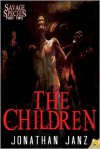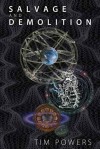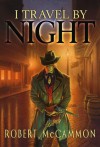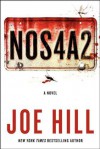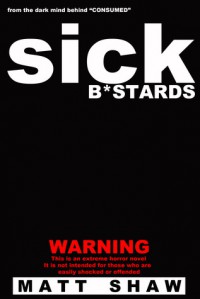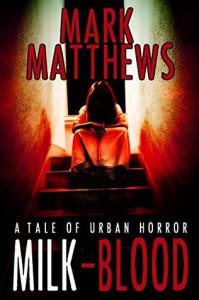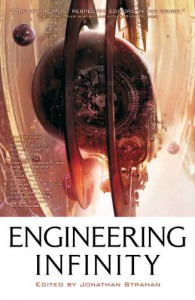
Brainycat's 5 "B"s:
blood: 3
boobs: 1
bombs: 3
bondage: 4
blasphemy: 4
Stars: 5
Bechdel Test: PASS
Deggan's Rule: PASS
Gay Bechdel Test: FAIL
Please note: I don't review to provide synopses, I review to share a purely visceral reaction to books and perhaps answer some of the questions I ask when I'm contemplating investing time and money into a book.
This is a big book. I don't use the "count pages" plugin in Calibre, but AZN says it's 400 kindle pages. Some of these shorts would qualify as novellas on their own. It took me a long time to get through it (short bursts before I fell asleep at night) but it was totally worth the effort. I actually finished each story in this anthology which is a rarity for me - most collections have at least one dud that I give up on. I wasn't familiar with the editor Jonathan Strahan before I bought this; Peter Watts and Charles Stross sold the book to me. I still haven't read any of Jonathan's books, but I've become a big fan of his ability to put a collection of stories together and I've already bought the next two anthologies in the Infinity Project series. I finished the book a few days ago but I wanted some time to digest the book before I wrote some gushingly fanboyish review.
The styles of these stories run the gamut from "free form speculative fiction" all the way to "old school hard science fiction". There's a couple of "creature feature" stories in here, but it's not about the critters as much as it is about how humans can adapt and change. Engineering has been described as "the application of science", and to that end all of these stories examine the dialectic relationship of human(ish) peoples to adapt to the reality of the world around them, and in turn adapt the reality to peoples' needs. All of the stories are thoughtful, well written and each of the authors is now on my "their name will help sell books to me" list. This is an example of what I expect from an anthology - I want to be challenged, I want to have my horizons expanded, and I want a series of knockout punches that together add up to a whole greater than the parts. This book delivers on all counts.
'Malak' by Peter Watts
- A semiautonomous drone is programmed to assess the value of collateral damage before striking, and while optimizing it's algorithms to determine the easiest way to avoid politically costly civilian deaths it comes to some unexpected conclusions. I'm a HUGE fan of Peter Watts, and this story does not disappoint. Another knockout example of how dark, cynical and dystopic near futures needn't be cut from the same cloth as Neuromancer to be chillingly effective. Also, Peter did a spectacular job of writing from the POV of the drone without sounding like PacMan or Robocop, which is no small feat.
'Watching the Music Dance' by Kristine Kathryn Rusch
- Over the last few years, major software sellers have been moving away from the boxed model - where you buy an unlimited license for a version - and replaced it with a subscription model, where you pay a much smaller fee every month and get a limited time license but all upgrades are included. This has caused no small amount of consternation among sizable number of consumers who want to own their tools outright. Software running on a computer is one thing, but what about software we install into our brains? To whom do we want to be beholden to with regards to neurological enhancements: The companies making products? Parents trying to give their young children every possible chance to succeed? This is a poignant story that addresses these questions and leaves the reader with a number of questions to ponder rather than a tidy conclusion.
'Laika's Ghost' by Karl Schroeder
- Not the strongest story in the bunch, but that's a reflection of the overall quality of the collection rather than any real weakness in this story. What starts off as a straightforward cyberpunky conspiracy story a'la "young hacker finds out too much, has to go into hiding from Big Corporation" turns into a byzantine world where the conspiracy is much bigger and a lot older than Big Corporation, and has implications for everyone on the planet. Well written and very atmospheric, this story falls short of the others because I felt like it didn't really sink it's teeth into some of the questions it raises.
'The Invasion of Venus' by Stephen Baxter
- Every so often, while reading SciFi, I run across a story that verbalizes so much more eloquently than I could my ideas about how Some Big Event would play out in reality. The Big Event in this case is "discovering alien intelligences", and the way it plays out is "They're not even a little bit interested in a bunch of primates flinging poo at each other on some watery ball of mud". The story plays out as an extended allegorical conversation between a scientist and a woo-woo vaguely theistic character who are trying to come to grips with the knowledge that humanity is only the center of it's own world, and is inconsequential on the interstellar scale.
'The Server and the Dragon' by Hannu Rajaniemi
- A long, long time after the singularity and in a star system far, far away the fruits of technology are far from safe. What is the relationship between predator and prey in the interstellar scale? This is another of the (relatively) weaker stories in the collection; I felt it took a long time to get to where it's going, but one could make an argument that that helps to show the monumental scale of how these sorts of things play out.
'Bit Rot' by Charles Stross
- I have no doubt posterity will remember this as the seminal Post-Human zombie story. In Charles's entirely capable hands, the story stays entirely clear of the obvious horror tropes and stays firmly in the scifi camp, even though it's basically a zombie story played out on an interstellar ship manned by post-humans many generations removed from their biologically bound progenitors. An excellent read, and a fantastic demonstration of how no matter how capable and how carefully you plan, something can always go catastrophically wrong.
'Creatures with Wings' by Kathleen Ann Goonan
- This story could've been a disaster, but careful writing saved it. It veered dangerously close to reading like one of those intensely allegorical inward journey of self discovery, but deftly avoided feeling like I was witnessing the author mentally masturbating while gazing deeply into her navel. That's a fine line to walk along a slippery slope, and major kudos to the author for staying on the straight and narrow. While I'm not even a little bit religious in the slightest, I do have a soft spot for the Buddhists and this story is driven by Buddhist principles and ideals. The first of two stories that try to provide a scifi retelling of classic religious tales, I think this one works much better than the other and it's certainly left a more lasting impression on me.
'Walls of Flesh, Bars of Bone' by Damien Broderick and Barbara Lamar
- A very well written story that tries to work out how time travelling paradoxes could be self-healing. Not much going in the way of characterization or setting, but the plot moves along well and it was very well written. The quality of the writing, in that it stays out of the way and paints details only where they're needed, is what made this otherwise pedestrian story maintain the caliber of the rest of the collection.
'Mantis' by Robert Reed
- The most unashamedly postmodern of the stories, this plays on the idea that every window works both ways and then tries to push the analogy into the quantum realms by having the viewers effect the viewed - eg, everyone somehow effects each other even though they can only observe each other but not communicate. Not the strongest story in the book, but it's a notch or two above the likes of "Laika's Ghost" or "Mercies".
Judgement Eve, John C. Wright
- The second SciFi retelling of a religious parable, this time the subject is the ejection of mankind from the Garden of Eden from the Abrahamaic traditions. The characters and the world they inhabit felt to me like a pale rehash of Walter Jon Williams' "Aristoi", though to be fair only a wee part of creation and a tiny cast of characters is important to this story so maybe the sample is skewed. I didn't feel particularly impressed by this rendition of what the fall could be like in a post-humanist, nano-machine enabled world and I found myself skimming hoping something unexpected would happen. I got to the end of story with no surprises. "Mantis" is the better religious parable in this collection.
A Soldier of the City, David Moles
- A lost soldier, hopelessly cut off from the unit to which he owes fanatical allegiance, wins the hearts and minds of a distant and backwards people while in turn learning to be more empathic and understanding of other cultures. Not unlike the movie Soldier, actually. Except different - much more talking and a lot less action. I liked the world building, and any story where gods walk among mortals - and themselves can be killed by megatonnage weoponry - has my interest right away.
Mercies, Gregory Benford
- Oh my. In Formula One racing right now, there's a debate going on about the cost of competing in the sport. The school of thought I subscribe to believes that the backmarker teams - less well funded, and who will never win races let alone championships - are a vital part of the sport because they make sure the big name teams never come in last and their sponsors never have to face the indignity of being on a car at the bottom of the results listing. I feel like this story does the same job for this book. There just wasn't anything new or interesting in the plot, the writing was average with some big plot holes and stiff dialogue, the premise was shaky at best, the setting was perpetually unpolished and I never found myself caring what happened to the protagonist. Other than all that, though, it was a good story.
The Ki-anna, Gwyneth Jones
- This story has all the characterization and world building that's lacking in Mercies, with an interesting noirish detective thriller thrown in for good measure. It was a very enjoyable little "trek" story - ostensibly, it's about getting the protagonist from an orbiting station down to the surface of the planet and into a temple, but slowly and delightfully the plot thickens until all the players are trying to get somewhere physically and emotionally. An interesting story with some direct references to contemporary race and class struggles that works on a variety of levels, and has definitely put Gwyneth Jones on my watch list.
The Birds and the Bees and the Gasoline Trees, John Barnes
- Probably the most relatable story to our contemporary world, it's placed in the near future where the first post-humans are still regarded as anomolous superstars. After using exophysics to try to tame rampant climate change, humans come to understand that for as much as we believe the anthropocene era is the most cataclysmic chapter in earth's history, the fact is we're still just a bunch of baby faced primates who just got here a few years ago - and our idea of "status quo" is hopelessly faulted by our tiny little sample size.


 7
7
 9
9






